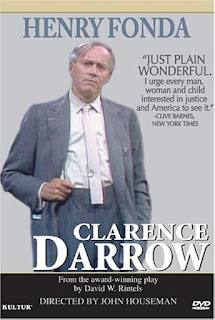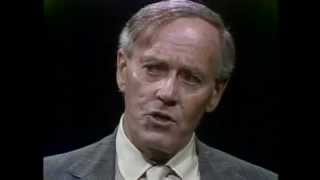CLARENCE DARROW
It is not surprising to see Henry Fonda play Clarence Darrow in a one-man show. Fonda, like Darrow, was firmly on the political Left, and Clarence Darrow tells his story. Fortunately, Clarence Darrow is not some crazed political diatribe. Instead, it is a well-acted exploration of the man, who had humor, some regrets and an unbending sense of principle.
Taking on the form of the old Darrow speaking to us, Clarence Darrow covers his life and career. He speaks of his earliest memories: his father as a conductor on the Underground Railroad and his mother supporting women's suffrage long before it was popular. From that, Clarence Darrow took up many causes. He fought against railroad corporations, defended various labor movement activists and Socialist presidential candidate Eugene Debs. Later in his career, he went on to defend people as various as teacher John Scopes of the so-called "Monkey Trial" to Leopold & Loeb, the "thrill killers" who murdered a child acquaintance.
Darrow also recalls some anecdotes from his private life. Sometimes they are witty, such as when he recalls enemies suggesting he'd spent the night with a beautiful widow and left in the morning. "My friends know I wouldn't have left at dawn. I'd have stayed for breakfast!". When traveling through the Holy Land, Darrow balked at the cost for a boat ride across the Sea of Galilee. "All he (the boat owner) wanted was $15. No wonder Jesus walked".
Other memories though, are not so cute. He touches on his divorce. "I'm sorry, Jess. I think I need my freedom," he recalls telling his first wife. Recalling his defense of Dr. Ossian Sweet, a black man charged with murdering a white man during a riot, his memories of what he saw express deep pain. He ends his story by saying he wishes to have his story recorded in the Book of Love.
Clarence Darrow is sometimes erroneously listed as having been "directed by John Houseman" (the Best Supporting Actor Oscar winner for The Paper Chase). John Rich was the actual director, with Houseman serving as "artistic advisor". Rich and Fonda worked excellently to bring Darrow's life and career into focus.
Fonda has that everyman quality that translates well to the role. His Darrow is a folksy yet shrewd lawyer, passionate about the law and fighting injustice and prejudice. "I don't believe in Socialism", he recalls telling a railroad executive, "but I do believe that government's ownership of railroads is better for the people than railroad ownership of the government".
It is difficult to hold an audience's attention for an hour-plus, but Fonda succeeds beyond anything I could have imagined. His success comes from how Darrow takes the audience as a partner, someone he can converse with. Fonda as Darrow does not go for big moments or gestures. Instead, by keeping things simple, Fonda makes us believe that it is Clarence Darrow speaking to us.
Clarence Darrow is a masterclass in how a strong actor can hold your attention all by himself. Minus a slight stumble when discussing the McNamara saga which came across as a bit dry and when he transitions from the Scopes trial to Leopold & Loeb, Clarence Darrow is a showcase for both Clarence Darrow and Henry Fonda.
8/10


No comments:
Post a Comment
Views are always welcome, but I would ask that no vulgarity be used. Any posts that contain foul language or are bigoted in any way will not be posted.
Thank you.